Your cart is currently empty!
Category: Japanese – Intermediate
Welcome to Japanese – Intermediate! 🎯 This section is perfect for learners who already know the basics and want to deepen their understanding of the language. From complex grammar to more advanced vocabulary, these lessons will help you take your Japanese skills to the next level.
Here, you’ll find:
🔹 Intermediate grammar such as verb conjugations, honorifics (keigo), and adjective usage
🔹 Expanded vocabulary for both formal and informal situations
🔹 Practice dialogues to improve conversational skills
🔹 Listening and comprehension activities
🔹 Cultural insights to understand Japanese society and communication
Let’s build on your foundation and get you closer to fluency!
-
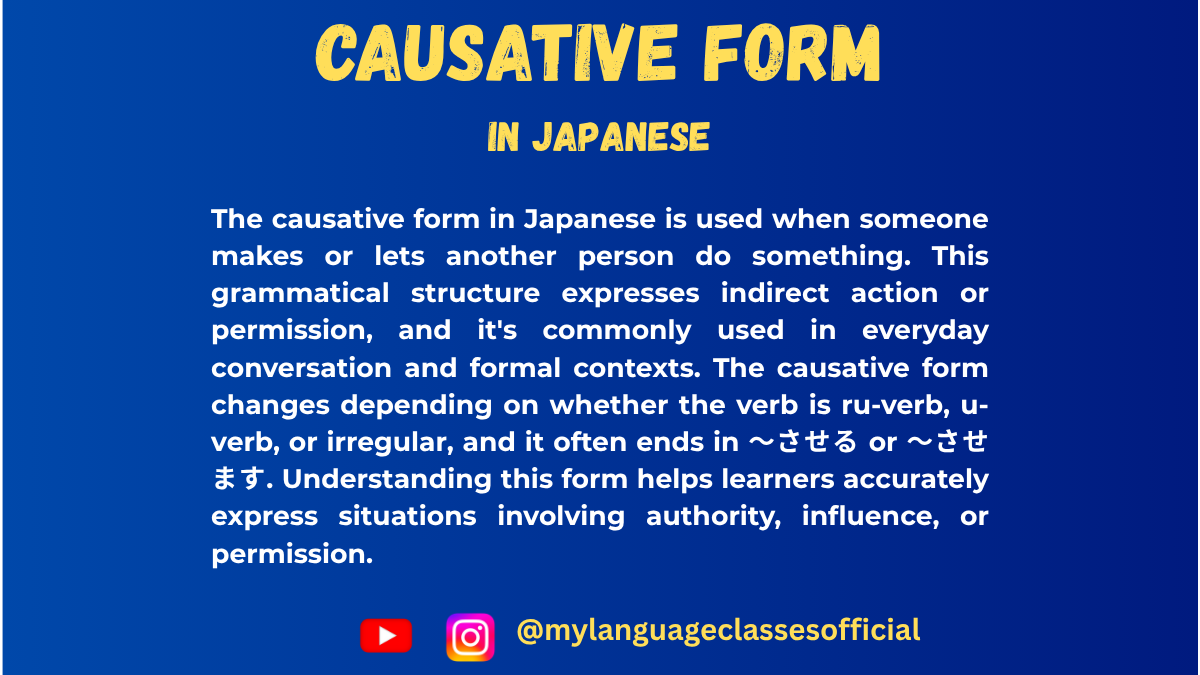
Causative Form of Verbs in Japanese
Understanding Causative Form in Japanese
The causative form in Japanese is used to express situations where someone makes or allows another person to do something. This grammatical structure is essential for both beginners and intermediate learners as it plays a vital role in daily conversations and formal settings.
Formation of the Causative Form
The causative form in Japanese follows a specific conjugation pattern based on the verb group.
Group 1 (Ichidan Verbs – る-verbs)
- Drop る and add させる
- Example: 食べる → 食べさせる (taberu → tabesaseru) – “to make/let someone eat”
Group 2 (Godan Verbs – う-verbs)
- Change the final う sound to あ and add せる
- Example: 書く → 書かせる (kaku → kakaseru) – “to make/let someone write”
Irregular Verbs
- する → させる
- くる → こさせる
Usage of Causative Form
1. Making Someone Do Something
When the subject forces someone to do something.
- 先生は生徒に本を読ませた。
- Sensei wa seito ni hon o yomaseta.
- “The teacher made the student read the book.”
2. Allowing Someone to Do Something
When the subject permits another person to do something.
- 母は子供にアイスクリームを食べさせた。
- Haha wa kodomo ni aisukurīmu o tabesaseta.
- “The mother let the child eat ice cream.”
3. When Used with Intransitive Verbs
It means “to let someone” do something.
- 友達は私を早く帰らせた。
- Tomodachi wa watashi o hayaku kaeraseta.
- “My friend let me go home early.”
4. Causative-Passive Form (When Someone Is Made to Do Something Unwillingly)
- 先生に宿題をたくさんやらせられた。
- Sensei ni shukudai o takusan yaraserareta.
- “I was made to do a lot of homework by the teacher.”
Situations Where Causative Form Is Used
- Forcing someone to do something
- Giving permission to do something
- Describing workplace instructions
- Formal requests in a business setting
- Parenting and teaching situations
- Expressing feelings of obligation
- Telling someone to act on your behalf
Beginner and Intermediate Level Verbs with Causative Form and Example Sentences
Verb (Dictionary Form) Causative Form Example Sentence 1 Romaji English Example Sentence 2 Romaji English 食べる (taberu) 食べさせる (tabesaseru) 母は私に野菜を食べさせた。 Haha wa watashi ni yasai o tabesaseta. “My mother made me eat vegetables.” 先生は生徒に昼ご飯を食べさせた。 Sensei wa seito ni hirugohan o tabesaseta. “The teacher let the students eat lunch.” 行く (iku) 行かせる (ikaseru) 父は私を学校に行かせた。 Chichi wa watashi o gakkō ni ikaseta. “My father made me go to school.” 先生は生徒を旅行に行かせた。 Sensei wa seito o ryokō ni ikaseta. “The teacher let the students go on a trip.” 書く (kaku) 書かせる (kakaseru) 先生は生徒に作文を書かせた。 Sensei wa seito ni sakubun o kakaseta. “The teacher made the student write an essay.” 彼は弟に手紙を書かせた。 Kare wa otōto ni tegami o kakaseta. “He made his younger brother write a letter.”
More Example Sentences
- 先生は生徒に宿題をやらせた。
- 友達は私にその映画を見させた。
- 母は私に皿を洗わせた。
- 父は私にピアノを弾かせた。
- 会社は社員に報告書を書かせた。
- 医者は患者に薬を飲ませた。
- 先生は学生を立たせた。
- 兄は弟に犬を散歩させた。
- 友達は私に試験の問題を解かせた。
- 父は私に手伝いをさせた。
Fill in the Blanks
- 先生は生徒に本を ___ 。
- 母は子供に野菜を ___ 。
- 友達は私を早く ___ 。
- 父は私に宿題を ___ 。
- 医者は患者に薬を ___ 。
- 先生は生徒に黒板に字を ___ 。
- 社長は部下にレポートを ___ 。
- 兄は弟にピアノを ___ 。
- 友達は私に試験の答えを ___ 。
- 先生は学生を立たせた。
Answers
- 読ませた
- 食べさせた
- 帰らせた
- やらせた
- 飲ませた
- 書かせた
- 書かせた
- 弾かせた
- 解かせた
- 立たせた
Things to Keep in Mind
- The causative form can indicate both “making someone do” and “letting someone do” an action.
- The causative-passive form (e.g., やらせられる) is often used when someone is forced to do something against their will.
- The particle に is used to indicate the person being caused to act.
- Some sentences may sound unnatural if used without context, so always consider the situation.
Conclusion
The causative form in Japanese is essential for expressing permission, coercion, and obligation. Mastering it will help you create more nuanced sentences in conversations and formal settings. Keep practicing with different verbs and contexts, and soon, using the causative form will become second nature!
If you enjoyed this lesson, be sure to check out more posts like this on my blog at My Language Classes. Don’t forget to subscribe my YouTube channel and follow me on Instagram for the latest language learning tips and lessons. Leave a comment below to share your thoughts, or ask any questions you have about nouns.
Happy learning! 😊
📚 Continue Learning Japanese
- Drop る and add させる
-
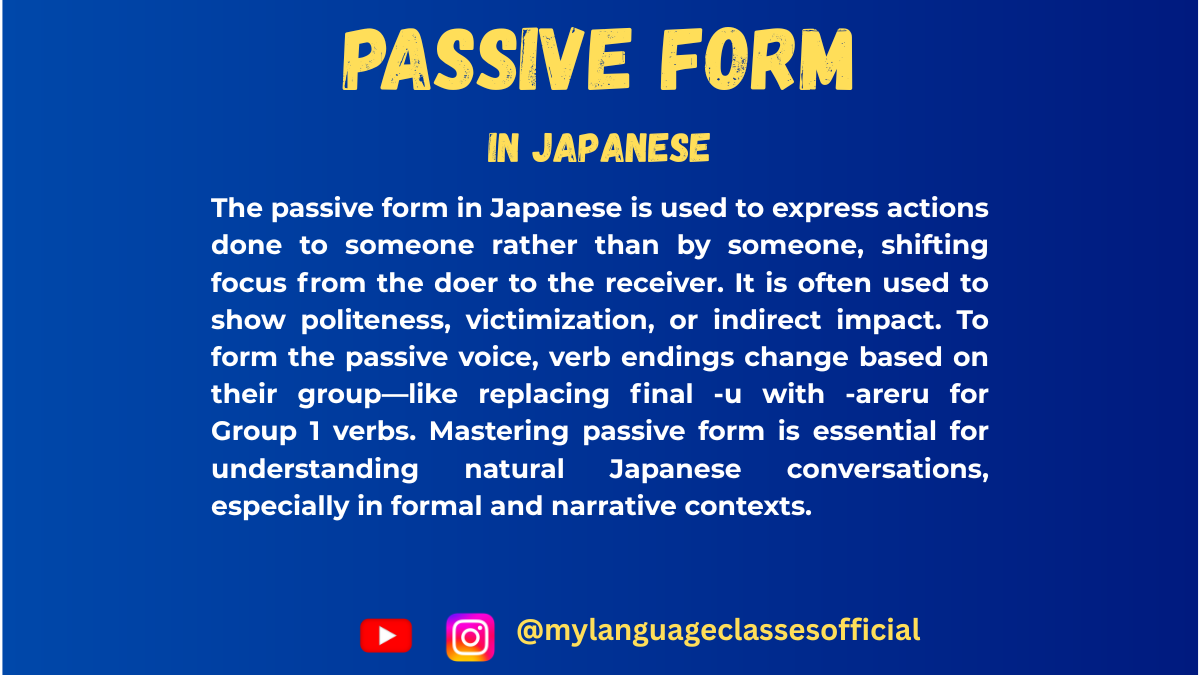
Passive Form of Verbs in Japanese
Understanding Passive Form verbs in Japanese
The passive form (受身形, うけみけい) in Japanese is used in various situations, primarily to describe actions where the subject is affected by someone else’s actions. Unlike in English, where the passive voice is often avoided, Japanese frequently uses it in daily conversations and formal writing. In this blog post, we will thoroughly explore the formation and usage of passive verbs in different contexts.
Usage of Passive Form in Japanese
The passive form is used in the following situations:
- When someone is negatively affected by an action (被害受身 – ひがいうけみ)
- Japanese: 私は弟にケーキを食べられました。
- Romaji: Watashi wa otōto ni kēki o taberaremashita.
- Meaning: I had my cake eaten by my younger brother.
- When describing an event from the perspective of the affected person
- Japanese: 私は先生にほめられました。
- Romaji: Watashi wa sensei ni homeraremashita.
- Meaning: I was praised by my teacher.
- When discussing historical or public events
- Japanese: このお寺は100年前に建てられました。
- Romaji: Kono otera wa hyaku nen mae ni tateraremashita.
- Meaning: This temple was built 100 years ago.
- When avoiding mentioning the doer explicitly (formal, impersonal expressions)
- Japanese: 日本ではお米が多く食べられています。
- Romaji: Nihon de wa okome ga ōku taberareteimasu.
- Meaning: Rice is widely eaten in Japan.
- When talking about natural phenomena
- Japanese: その山は雪で覆われています。
- Romaji: Sono yama wa yuki de ōwareteimasu.
- Meaning: That mountain is covered with snow.
- In literary or poetic expressions
- Japanese: 彼女の歌は世界中で聞かれています。
- Romaji: Kanojo no uta wa sekaijū de kikareteimasu.
- Meaning: Her songs are heard all over the world.
Formation of Passive Verbs
Japanese verbs are categorized into three groups. The passive form is formed differently for each group.
Group 1 (Ichidan verbs / 一段動詞)
Formation: Drop the final る and add られる
Verb Potential Form Passive Form Example Sentence (Japanese) Romaji Meaning 食べる (たべる) 食べられる 食べられる 私は友達にお菓子を食べられた。 Watashi wa tomodachi ni okashi o taberareta. I had my sweets eaten by a friend. 見る (みる) 見られる 見られる 私の秘密はみんなに見られた。 Watashi no himitsu wa minna ni mirareta. My secret was seen by everyone. 教える (おしえる) 教えられる 教えられる 日本語は先生に教えられた。 Nihongo wa sensei ni oshierareta. Japanese was taught by the teacher. Group 2 (Godan verbs / 五段動詞)
Formation: Change the final u sound to a sound and add れる
Verb Potential Form Passive Form Example Sentence (Japanese) Romaji Meaning 書く (かく) 書ける 書かれる 私の名前が黒板に書かれた。 Watashi no namae ga kokuban ni kakareta. My name was written on the blackboard. 読む (よむ) 読める 読まれる この本は多くの人に読まれた。 Kono hon wa ōku no hito ni yomareta. This book was read by many people. 言う (いう) 言える 言われる 先生に「すごい」と言われた。 Sensei ni “sugoi” to iwareta. I was told “amazing” by the teacher. Group 3 (Irregular verbs / 不規則動詞)
Verb Potential Form Passive Form Example Sentence (Japanese) Romaji Meaning する できる される 彼の仕事は上司に評価された。 Kare no shigoto wa jōshi ni hyōka sareta. His work was evaluated by the boss. 来る (くる) 来られる 来られる 私の家に友達が来られた。 Watashi no ie ni tomodachi ga korareta. A friend came to my house.
More Example Sentences
- 彼は友達にからかわれた。 (Kare wa tomodachi ni karakawareta.) – He was teased by his friends.
- 雨が降って、試合が中止された。 (Ame ga futte, shiai ga chūshi sareta.) – The match was canceled due to rain.
- 私の自転車が盗まれた。 (Watashi no jitensha ga nusumareta.) – My bicycle was stolen.
- その映画は世界中で見られている。 (Sono eiga wa sekaijū de mirareteiru.) – The movie is being watched worldwide.
- 彼は先生に叱られた。 (Kare wa sensei ni shikarareta.) – He was scolded by the teacher.
- この本は多くの人に読まれた。 (Kono hon wa ōku no hito ni yomareta.) – This book was read by many people.
- 先生に質問が聞かれた。 (Sensei ni shitsumon ga kikareta.) – A question was asked by the teacher.
- 日本では魚がよく食べられる。 (Nihon de wa sakana ga yoku taberareru.) – Fish is often eaten in Japan.
- その話は新聞に書かれていた。 (Sono hanashi wa shinbun ni kakareteita.) – That story was written in the newspaper.
- 彼の名前は歴史に残されている。 (Kare no namae wa rekishi ni nokosareteiru.) – His name is left in history.
Fill in the Blanks Exercise:
- 私の名前が黒板に____。
- 先生にほめ____。
- 私は友達にお弁当を____。
- その建物は100年前に____。
- その映画はたくさんの人に____。
- 宿題が____。
- 彼は友達に____。
- その話は新聞に____。
- 日本では魚がよく____。
- 彼の仕事は上司に____。
Answers:
- 書かれた 2. られた 3. 食べられた 4. 建てられた 5. 見られた 6. された 7. からかわれた 8. 書かれた 9. 食べられる 10. 評価された
Things to Keep in Mind
- Passive verbs often imply an indirect effect on the subject.
- Passive form is commonly used in formal writing and polite speech.
- Certain verbs are more frequently used in passive form, such as 言う (to say), 書く (to write), and する (to do).
- When the subject is negatively affected, the nuance of 被害受身 (negative passive) comes into play.
- Passive sentences often omit the doer (agent) for a softer, indirect tone.
Conclusion
Mastering the passive form of verbs in Japanese is crucial for fluency and understanding natural speech patterns. It is widely used in both formal and informal contexts. By practicing passive verb conjugations and understanding their nuanced usage, learners can improve their comprehension and communication skills in Japanese effectively. Keep practicing and using these forms in daily conversation to become more proficient!
If you enjoyed this lesson, be sure to check out more posts like this on my blog at My Language Classes. Don’t forget to subscribe my YouTube channel and follow me on Instagram for the latest language learning tips and lessons. Leave a comment below to share your thoughts, or ask any questions you have about nouns.
Happy learning! 😊
📚 Continue Learning Japanese
- When someone is negatively affected by an action (被害受身 – ひがいうけみ)
-
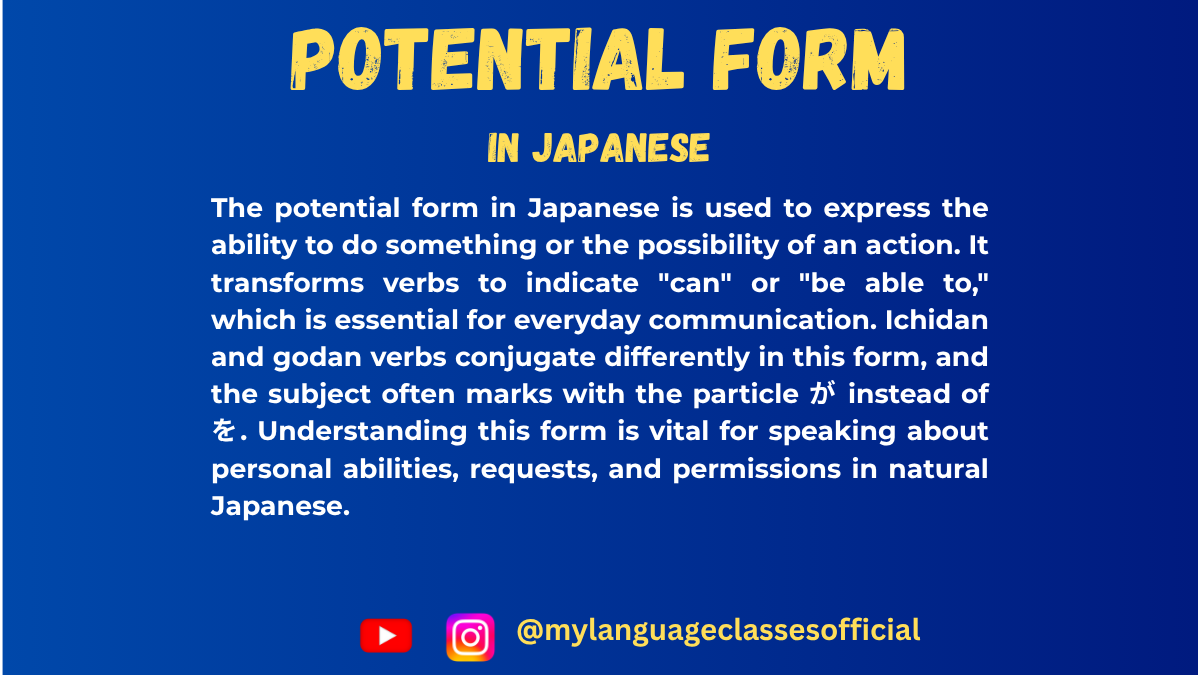
Potential Form of Verbs in Japanese
Understanding Potential Form
The potential form (可能形, かのうけい) of verbs in Japanese expresses the ability or possibility to do something. This form is widely used in everyday conversations to talk about what someone can or cannot do.
Usage of Potential Form in Different Situations
- Expressing Ability
- 日本語を話せます。(I can speak Japanese.)
- Expressing Capability
- ここから富士山が見えます。(You can see Mount Fuji from here.)
- Expressing Permission
- この図書館では本を借りられます。(You can borrow books in this library.)
- Expressing Physical or Situational Possibility
- 今日は忙しいので、映画に行けません。(I am busy today, so I can’t go to the movies.)
- Expressing Potential in Hypothetical Scenarios
- 彼が来たら、もっと話せると思います。(If he comes, I think I will be able to talk more.)
- Asking About Ability
- ピアノが弾けますか? (Can you play the piano?)
- Denying Capability
- 漢字が読めません。(I can’t read kanji.)
- Expressing Limited Ability (Using なら)
- スペイン語なら話せます。(If it’s Spanish, I can speak it.)
Formation of Potential Form
Japanese verbs are categorized into three groups, and the potential form is formed differently for each.
Group 1 (Godan Verbs / 五段動詞)
For 五段動詞 (Godan verbs), replace the final う sound with える.
Dictionary Form Potential Form Example Sentence 1 Example Sentence 2 書く (to write) 書ける 日本語が書けます。(I can write in Japanese.) 漢字が書けません。(I can’t write kanji.) 行く (to go) 行ける 明日、海に行けます。(I can go to the beach tomorrow.) 東京には行けません。(I can’t go to Tokyo.) 話す (to speak) 話せる 日本語が話せますか?(Can you speak Japanese?) 彼は英語が話せません。(He can’t speak English.) 飲む (to drink) 飲める お酒が飲めますか?(Can you drink alcohol?) ビールが飲めません。(I can’t drink beer.) 泳ぐ (to swim) 泳げる 彼は速く泳げます。(He can swim fast.) 海では泳げません。(I can’t swim in the sea.) 買う (to buy) 買える この店でケーキが買えます。(You can buy cakes at this shop.) 今日は買えません。(I can’t buy it today.) 作る (to make) 作れる 美味しい料理が作れます。(I can make delicious food.) パンは作れません。(I can’t make bread.) Group 2 (Ichidan Verbs / 一段動詞)
For 一段動詞 (Ichidan verbs), replace る with られる.
Dictionary Form Potential Form Example Sentence 1 Example Sentence 2 食べる (to eat) 食べられる 何でも食べられます。(I can eat anything.) 魚が食べられません。(I can’t eat fish.) 見る (to see) 見られる この映画が見られます。(You can watch this movie.) 明日は見られません。(I can’t watch it tomorrow.) 着る (to wear) 着られる 和服が着られます。(I can wear a kimono.) その服は着られません。(I can’t wear those clothes.) 起きる (to wake up) 起きられる 朝6時に起きられます。(I can wake up at 6 AM.) 今日は早く起きられません。(I can’t wake up early today.) 忘れる (to forget) 忘れられる 昨日のことが忘れられます。(I can forget about yesterday.) その話は忘れられません。(I can’t forget that story.) Group 3 (Irregular Verbs / 不規則動詞)
The two irregular verbs in Japanese have unique potential forms.
Dictionary Form Potential Form Example Sentence 1 Example Sentence 2 する (to do) できる サッカーができます。(I can play soccer.) 今日は運動ができません。(I can’t exercise today.) 来る (to come) 来られる 彼は会議に来られます。(He can come to the meeting.) 明日は来られません。(I can’t come tomorrow.) More Example Sentences
- 私は日本語が話せます。
(I can speak Japanese.) → [Godan Verb: 話す → 話せる] - この店ではケーキが買えます。
(You can buy cakes at this shop.) → [Godan Verb: 買う → 買える] - 今日は早く起きられません。
(I can’t wake up early today.) → [Ichidan Verb: 起きる → 起きられる] - この映画はネットで見られます。
(You can watch this movie online.) → [Ichidan Verb: 見る → 見られる] - ピアノが弾けますか?
(Can you play the piano?) → [Godan Verb: 弾く → 弾ける] - 彼は速く泳げます。
(He can swim fast.) → [Godan Verb: 泳ぐ → 泳げる] - 明日は学校に行けません。
(I can’t go to school tomorrow.) → [Godan Verb: 行く → 行ける] - この本は図書館で借りられます。
(You can borrow this book from the library.) → [Ichidan Verb: 借りる → 借りられる] - サッカーができますか?
(Can you play soccer?) → [Irregular Verb: する → できる] - 彼は明日の会議に来られます。
(He can come to tomorrow’s meeting.) → [Irregular Verb: 来る → 来られる]
These examples cover various real-life situations where the potential form is commonly used. Let me know in comment if you need more examples!
Fill in the Blanks Exercise:
- 日本語が____ますか? (Can you speak Japanese?)
- この映画はネットで____ます。 (You can watch this movie online.)
- 今日は早く____ません。 (I can’t wake up early today.)
- 美味しい料理が____ますか? (Can you make delicious food?)
- ここでは写真を____ません。 (You can’t take pictures here.)
- 彼女はピアノが____ません。 (She can’t play the piano.)
- この店ではケーキが____ます。 (You can buy cakes at this shop.)
- その本が____ますか? (Can you read that book?)
- 彼は会議に____ますか? (Can he come to the meeting?)
- お酒が____ません。 (I can’t drink alcohol.)
Answers
- 話せ
- 見られ
- 起きられ
- 作れ
- 撮れ
- 弾け
- 買え
- 読め
- 来られ
- 飲め
Notes on Usage
- Shortened Form of Ichidan Verbs: In casual speech, some people drop ら from られる and say 食べれる, 見れる, etc. However, this is considered informal and not grammatically standard.
- Using を or が: When using potential form, the object marker を is often replaced with が.
- Correct: 漢字が書ける。
- Acceptable (less common): 漢字を書ける。
- Negative Form: Add ない to the potential form.
- 漢字が読めない (I can’t read kanji.)
- Polite Form: Add ます to the potential form.
- 漢字が読めます (I can read kanji.)
Mastering the potential form will help you express what you can and cannot do in Japanese fluently! Try using it in daily conversations to reinforce your understanding. 頑張ってください! (Good luck!)
If you enjoyed this lesson, be sure to check out more posts like this on my blog at My Language Classes. Don’t forget to subscribe my YouTube channel and follow me on Instagram for the latest language learning tips and lessons. Leave a comment below to share your thoughts, or ask any questions you have about nouns.
Happy learning! 😊
📚 Continue Learning Japanese
- Expressing Ability
-
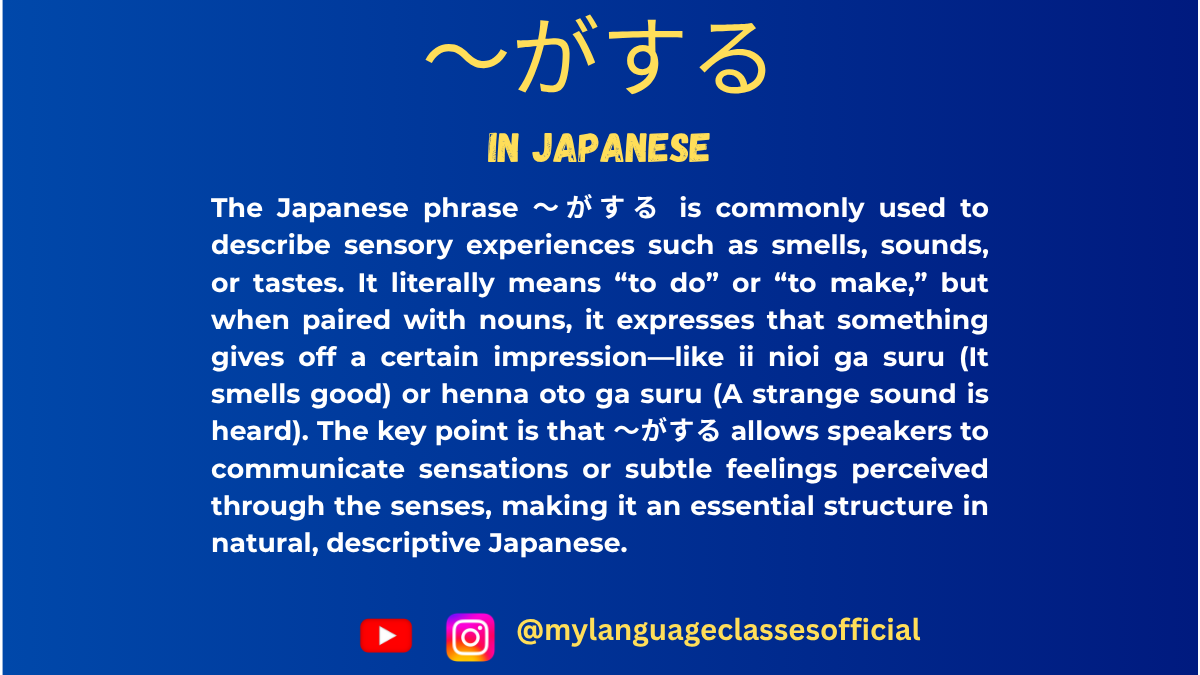
Understanding 〜がする in Japanese
Understanding the Usage of 〜がする in Japanese
The expression 〜がする is a common grammatical structure in Japanese used to describe perceptions and sensations related to the five senses, as well as intuitive feelings. It is often translated as “to smell,” “to taste,” “to feel,” or “to sound like.” This phrase allows the speaker to express their sensory or emotional experience in a natural way.
Basic Structure of 〜がする
The pattern generally follows this structure:
[Noun] + がする
Here, [Noun] represents something perceived through the senses (such as smell, taste, sound, or feeling). The verb する indicates that the sensation exists.
Situations Where 〜がする is Used
Below are the different contexts where 〜がする is commonly used:
1. Smell (Odor-related Perception)
Used when describing a smell that one perceives.
- 変なにおいがする。 (Henna nioi ga suru.) – “There is a strange smell.”
- 花の香りがする。 (Hana no kaori ga suru.) – “I smell the fragrance of flowers.”
- ガスのにおいがする。 (Gasu no nioi ga suru.) – “It smells like gas.”
2. Taste (Flavor-related Perception)
Used when describing the taste of something.
- 変な味がする。 (Henna aji ga suru.) – “It has a strange taste.”
- この水は鉄の味がする。 (Kono mizu wa tetsu no aji ga suru.) – “This water tastes like iron.”
- 甘い味がする。 (Amai aji ga suru.) – “It tastes sweet.”
3. Sound (Auditory Perception)
Used when describing a sound that one hears.
- ドアの開く音がする。 (Doa no hiraku oto ga suru.) – “I hear the sound of a door opening.”
- 雷の音がする。 (Kaminari no oto ga suru.) – “I hear the sound of thunder.”
- 人の話し声がする。 (Hito no hanashigoe ga suru.) – “I hear people’s voices.”
4. Feeling (Emotional or Intuitive Perception)
Used when describing a feeling, intuition, or an atmosphere.
- 嫌な感じがする。 (Iyana kanji ga suru.) – “I have a bad feeling.”
- 胸騒ぎがする。 (Munasawagi ga suru.) – “I have a premonition (of something bad).”
- ワクワクする感じがする。 (Wakuwaku suru kanji ga suru.) – “I have an exciting feeling.”
5. Physical Sensations (Pain or Bodily Feelings)
Used when describing physical sensations or discomfort.
- 頭が痛い感じがする。 (Atama ga itai kanji ga suru.) – “I feel like I have a headache.”
- 吐き気がする。 (Hakike ga suru.) – “I feel nauseous.”
- 寒気がする。 (Samuke ga suru.) – “I feel chills.”
6. Other Abstract Feelings and Situations
It can be used to describe abstract or indirect experiences.
- あの人は信用できない気がする。 (Ano hito wa shinyou dekinai ki ga suru.) – “I feel like that person is untrustworthy.”
- ここは何か違う感じがする。 (Koko wa nanika chigau kanji ga suru.) – “This place feels different.”
Key Points to Remember
- 〜がする is used to describe sensory experiences, including smell, taste, sound, and physical or emotional feelings.
- It is typically used with nouns related to perception, such as におい (smell), 味 (taste), 音 (sound), 気 (feeling), 感じ (sensation), 痛み (pain), etc.
- It can be used for both literal (real sensory perceptions) and abstract (intuition, atmosphere, emotions) experiences.
- The phrase makes statements subjective, meaning it expresses the speaker’s personal perception rather than an objective fact.
Conclusion
Understanding 〜がする is essential for expressing sensory perceptions naturally in Japanese. Whether you’re describing a delicious meal, a strange smell, an ominous feeling, or an unexpected noise, this structure is an invaluable tool in communication. Mastering its usage will enhance your ability to express experiences vividly and naturally in Japanese.
By practicing various sentence patterns using 〜がする, learners can deepen their understanding and fluency in Japanese conversation. Try using it in your daily observations to get more comfortable with its application!
If you enjoyed this lesson, be sure to check out more posts like this on my blog at My Language Classes. Don’t forget to subscribe my YouTube channel and follow me on Instagram for the latest language learning tips and lessons. Leave a comment below to share your thoughts, or ask any questions you have about nouns.
Happy learning! 😊
📚 Continue Learning Japanese
-
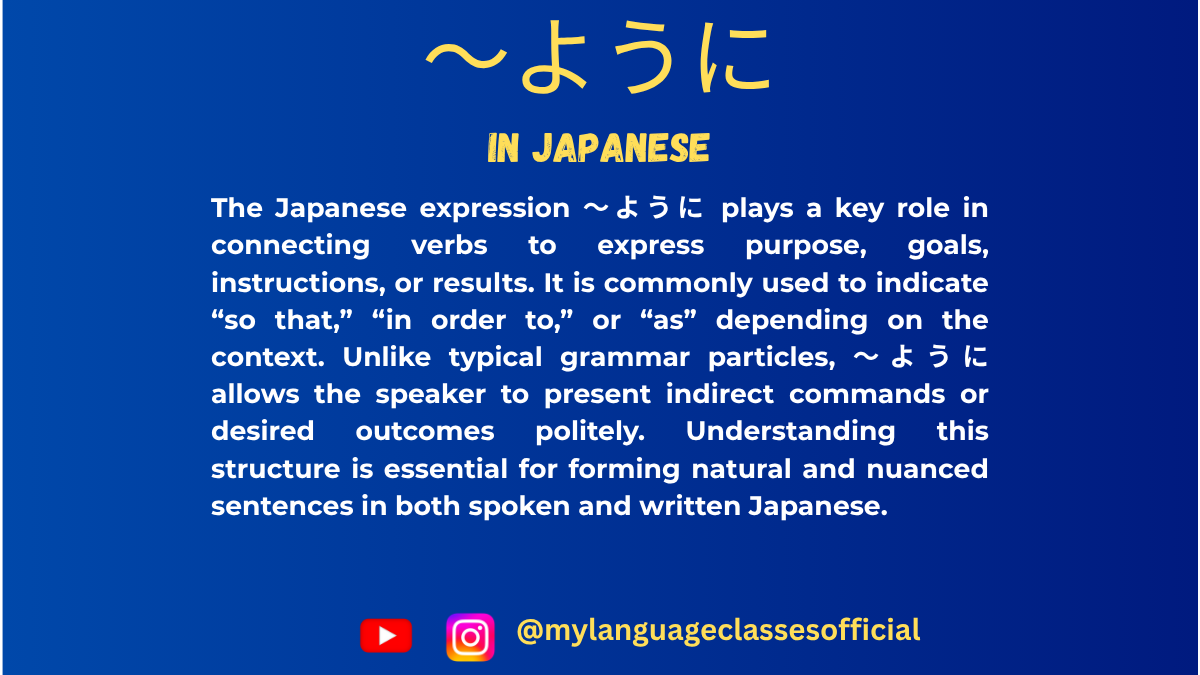
Understanding 〜ように in Japanese
Using 〜ように in Japanese
The Japanese expression 「〜ように」 is an essential grammatical structure that serves various purposes, including expressing hopes, requests, instructions, comparisons, goals, and habitual actions. This guide will provide an in-depth look at the different uses of 「〜ように」, along with clear explanations and example sentences.
1. Expressing Hopes or Wishes
「〜ように」 is used to express a hope or wish for something to happen, similar to saying “I hope that…” in English.
Structure:
Verb (potential form / negative form) + ように
Examples:
- 試験に合格できますように。
(Shiken ni goukaku dekimasu you ni.)
→ “I hope I can pass the exam.” - 雨が降らないように。
(Ame ga furanai you ni.)
→ “I hope it doesn’t rain.”
2. Expressing Goals or Objectives
This usage is similar to saying “in order to” in English. It indicates a goal or purpose for an action.
Structure:
Verb (potential form / dictionary form) + ように
Examples:
- 日本語が話せるように、毎日勉強しています。
(Nihongo ga hanaseru you ni, mainichi benkyou shiteimasu.)
→ “I study every day in order to be able to speak Japanese.” - 風邪を引かないように、マフラーをします。
(Kaze wo hikanai you ni, mafuraa wo shimasu.)
→ “I wear a scarf so that I don’t catch a cold.”
3. Giving Instructions or Advice (Indirect Commands)
When making polite or indirect requests, suggestions, or advice, 「〜ように」 is often used.
Structure:
Verb (plain non-past form) + ように 言う / 注意する / 頼む / 伝える
Examples:
- 先生は学生に宿題を忘れないように言いました。
(Sensei wa gakusei ni shukudai wo wasurenai you ni iimashita.)
→ “The teacher told the students not to forget their homework.” - 医者に早く寝るように注意された。
(Isha ni hayaku neru you ni chuui sareta.)
→ “The doctor advised me to sleep early.” - 彼に遅刻しないように頼みました。
(Kare ni chikoku shinai you ni tanomimashita.)
→ “I asked him not to be late.”
4. Making Comparisons
When used with verbs like なる (to become), 「〜ように」 can indicate a comparison or similarity.
Structure:
Noun + のように / Verb (plain form) + ように
Examples:
- 彼は先生のように話します。
(Kare wa sensei no you ni hanashimasu.)
→ “He speaks like a teacher.” - この部屋はまるでホテルのように綺麗です。
(Kono heya wa marude hoteru no you ni kirei desu.)
→ “This room is as clean as a hotel.”
5. Indicating Habitual Actions or Natural Consequences
This structure shows that something naturally happens or occurs habitually.
Structure:
Verb (dictionary form / negative form) + ようになる
Examples:
- 毎日練習して、日本語が話せるようになった。
(Mainichi renshuu shite, nihongo ga hanaseru you ni natta.)
→ “After practicing every day, I became able to speak Japanese.” - 最近、早く起きるようになりました。
(Saikin, hayaku okiru you ni narimashita.)
→ “Recently, I have started waking up early.”
6. Expressing Something Indirectly
When introducing a previous statement or explanation, 「〜ように」 can mean “as mentioned before” or “as expected.”
Structure:
Verb (plain form) + ように
Examples:
- 前に話したように、このプロジェクトは重要です。
(Mae ni hanashita you ni, kono purojekuto wa juuyou desu.)
→ “As I mentioned before, this project is important.” - 先生が言ったように、復習することが大切です。
(Sensei ga itta you ni, fukushuu suru koto ga taisetsu desu.)
→ “As the teacher said, reviewing is important.”
7. Expressing a Desired Outcome in a Prayer or Wish
This structure is common in prayers and formal expressions.
Structure:
Verb (potential form / negative form) + ように
Examples:
- みんなが幸せになりますように。
(Minna ga shiawase ni narimasu you ni.)
→ “I hope everyone becomes happy.” - 悪いことが起こらないように。
(Warui koto ga okoranai you ni.)
→ “I hope nothing bad happens.”
Summary: Situations Where 「〜ように」 is Used
Usage Meaning Example Expressing Hopes or Wishes “I hope that…” 試験に合格できますように。 Expressing Goals “In order to…” 日本語が話せるように勉強しています。 Giving Instructions / Advice Indirect commands 先生は学生に宿題を忘れないように言いました。 Making Comparisons “Like…” 彼は先生のように話します。 Indicating Habitual Actions “To become able to…” 日本語が話せるようになった。 Introducing Statements “As mentioned…” 前に話したように、このプロジェクトは重要です。 Expressing Wishes in Prayer Formal wishes みんなが幸せになりますように。
Conclusion
「〜ように」 is a versatile and essential grammar structure in Japanese. Understanding its different uses can greatly enhance your ability to communicate hopes, goals, indirect commands, comparisons, and habitual changes. By mastering this structure, you will sound more natural and fluent in Japanese!
Would you like me to cover any other grammar points in detail? Let me know in the comments!
If you enjoyed this lesson, be sure to check out more posts like this on my blog at My Language Classes. Don’t forget to subscribe my YouTube channel and follow me on Instagram for the latest language learning tips and lessons. Leave a comment below to share your thoughts, or ask any questions you have about nouns.
Happy learning! 😊
📚 Continue Learning Japanese
- 試験に合格できますように。
-
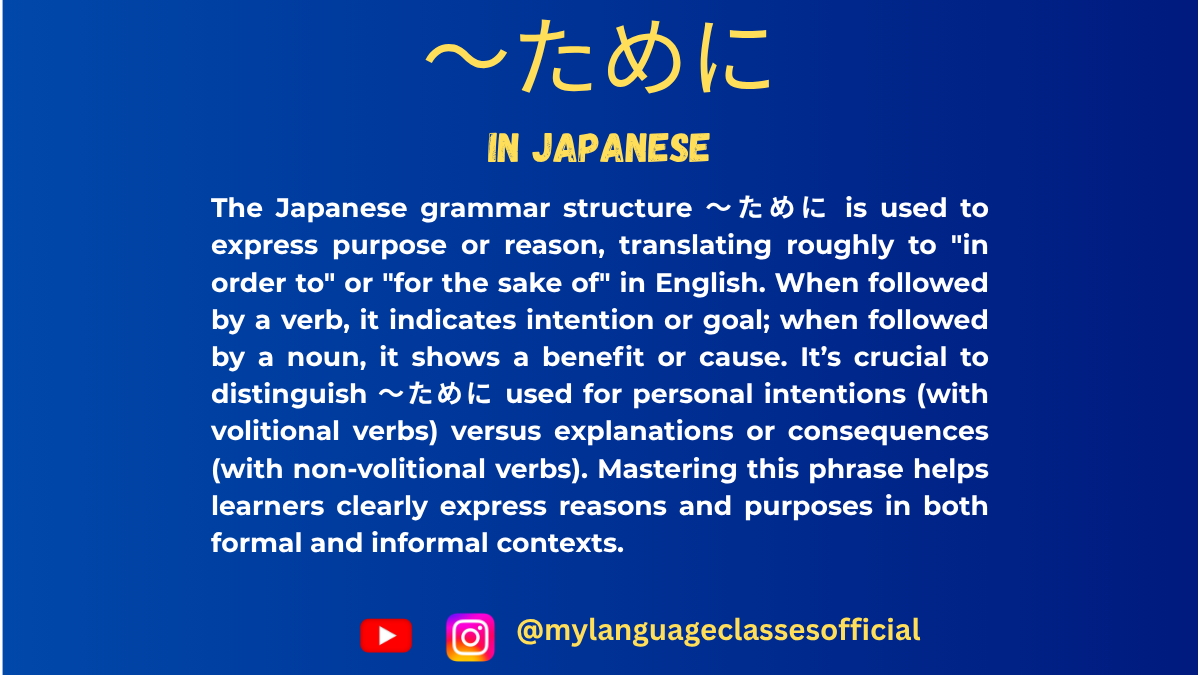
Using 〜ために in Japanese
Understanding 〜ために in Japanese
In Japanese, “〜ために” (tame ni) is a highly versatile grammatical structure used to indicate purpose, reason, or benefit. Understanding its different meanings and contexts is crucial for mastering the Japanese language.
This article will explain all the possible uses of “ために” along with example sentences and a list of situations where it is commonly used.
**1. Expressing Purpose (目的)
The most common use of “ために” is to express purpose or intention. In this case, it is used with dictionary form verbs or nouns.**
Structure:
- Verb (dictionary form) + ために
- Noun + の + ために
Examples:
- 体重を減らすために歩いています。 (I walk in order to lose weight.)
- 簡単な日本語を勉強するためにこのアプリを使う。 (I use this app to study simple Japanese.)
- 健康のために毎日ヨガをしています。 (For my health, I do yoga every day.)
Note:
- “ために” is used for intentional actions performed by someone with a goal in mind.
2. Expressing Reason or Cause (原因)
“ために” can also be used to express a reason or cause for a particular event, similar to “because of” in English.
Structure:
- Verb (plain past form) + ために
- Noun + の + ために
Examples:
- 天気が悪かったためにゲームが中止された。 (Because of bad weather, the game was canceled.)
- 病気のために休んだ。 (I took a break because of illness.)
- 仕事が大変だったためにとても疲れています。 (Because work was difficult, I am very tired.)
Note:
- In this case, the outcome is not controlled by the speaker and is often negative.
3. Expressing Benefit or Effect (利益)
Another meaning of “ために” is to indicate the benefit or positive effect of something.
Structure:
- Noun + の + ために
Examples:
- 子供のために私たちは最良の教育を提供したい。 (For the benefit of children, we want to provide the best education.)
- 世界のために安全な環境を作りましょう。 (For the benefit of the world, let’s create a safe environment.)
Note:
- This use of “ために” is often found in formal speech, policies, and slogans.
4. “ために” vs. “ように” (Comparison)
Both “ために” and “ように” express purpose, but they have different uses:
Phrase Used with Meaning ために Dictionary-form verbs (intentional) Purpose (the subject can control the action) ように Potential-form verbs or non-intentional actions Purpose (the subject cannot directly control the action) Examples:
- ために: 体重を減らすために歩いています。 (I walk in order to lose weight.)
- ように: 日本語を話せるように勉強している。 (I study so that I can speak Japanese.)
Key difference: “ために” is used when the subject can control the outcome, while “ように” is used for situations where the outcome depends on ability or an external factor.
Situations Where 〜ために is Used
Situation Example Expressing Purpose 旅行するためにお金を貯めています。 Expressing Reason 天気が悪かったためにコンサートが中止された。 Expressing Benefit 社会のために活動しています。
Conclusion
The structure “ために” is an essential part of Japanese grammar, used to express purpose, reason, and benefit. Mastering its different uses will greatly improve your ability to form complex and meaningful sentences in Japanese.
Understanding the differences between “ために” and similar expressions like “ように” will help you sound more natural in Japanese conversations. Keep practicing and using “ために” in different contexts!
If you enjoyed this lesson, be sure to check out more posts like this on my blog at My Language Classes. Don’t forget to subscribe my YouTube channel and follow me on Instagram for the latest language learning tips and lessons. Leave a comment below to share your thoughts, or ask any questions you have about nouns.
Happy learning! 😊
📚 Continue Learning Japanese
-
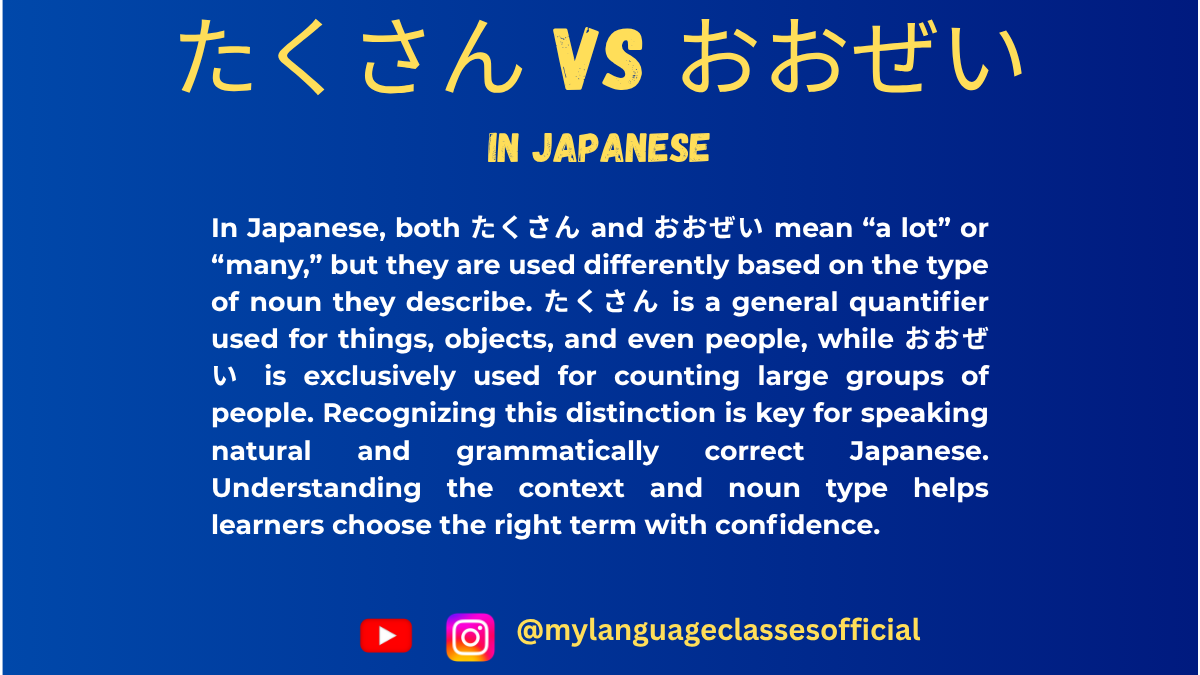
たくさん vs おおぜい: the Differences in Japanese
たくさん vs おおぜい
When learning Japanese, many students come across the words たくさん (takusan) and おおぜい (oozei), both of which mean “a lot” or “many.” However, they are not interchangeable in every situation. Understanding their nuances will help you use them naturally in conversations and writing.
1. Basic Meaning and Key Difference
- たくさん (takusan): Means “a lot,” “many,” or “plenty” and can be used for both countable and uncountable nouns.
- おおぜい (oozei): Specifically refers to “a large number of people” and is used only for people.
2. Usage of たくさん (takusan)
A. With Countable and Uncountable Nouns
- たくさん can be used with both things that can be counted (books, apples, pens) and things that cannot be counted (water, happiness, love).
Examples:
- 机の上に本がたくさんあります。
Tsukue no ue ni hon ga takusan arimasu.
→ There are many books on the desk. - 今日は仕事がたくさんあります。
Kyou wa shigoto ga takusan arimasu.
→ I have a lot of work today. - 私はお金をたくさん持っています。
Watashi wa okane o takusan motteimasu.
→ I have a lot of money.
B. Placement of たくさん in a Sentence
- Before the noun (less common in daily speech):
- たくさんの友達がいます。(Takusan no tomodachi ga imasu.)
→ I have many friends.
- たくさんの友達がいます。(Takusan no tomodachi ga imasu.)
- After the noun (more natural):
- 友達がたくさんいます。(Tomodachi ga takusan imasu.)
→ I have many friends.
- 友達がたくさんいます。(Tomodachi ga takusan imasu.)
- With verbs (indicating an action done in large amounts):
- ご飯をたくさん食べました。(Gohan o takusan tabemashita.)
→ I ate a lot of food.
- ご飯をたくさん食べました。(Gohan o takusan tabemashita.)
3. Usage of おおぜい (oozei)
A. Used Only for a Large Number of People
- おおぜい is exclusively used when talking about a crowd, a large number of people, or a gathering.
Examples:
- コンサートにはおおぜいの人が来ました。
Konsaato ni wa oozei no hito ga kimashita.
→ A large number of people came to the concert. - その町には観光客がおおぜいいました。
Sono machi ni wa kankoukyaku ga oozei imashita.
→ There were many tourists in that town. - おおぜいの学生が試験を受けました。
Oozei no gakusei ga shiken o ukemashita.
→ A lot of students took the exam.
B. Placement of おおぜい in a Sentence
- Before the noun:
- おおぜいの人が集まりました。(Oozei no hito ga atsumarimashita.)
→ Many people gathered.
- おおぜいの人が集まりました。(Oozei no hito ga atsumarimashita.)
- After the noun (less common but acceptable):
- 人がおおぜい集まりました。(Hito ga oozei atsumarimashita.)
→ A lot of people gathered.
- 人がおおぜい集まりました。(Hito ga oozei atsumarimashita.)
4. Situations Where たくさん and おおぜい Are Used
Situation Use たくさん Use おおぜい Talking about a large number of objects (books, apples, cars, etc.) ✅ Yes ❌ No Talking about a large quantity of uncountable things (water, love, money, etc.) ✅ Yes ❌ No Talking about a large number of people ✅ Yes ✅ Yes Talking about a crowd or a gathering of people ❌ No ✅ Yes Used with verbs like “eat” or “buy” (大量に食べる, 大量に買う) ✅ Yes ❌ No Used before a noun as an adjective ✅ Yes (たくさんの) ✅ Yes (おおぜいの) Used after a noun naturally ✅ Yes ✅ Yes (but limited to people) 5. Summary of Key Differences
Word Meaning Used for Example Sentence たくさん (takusan) A lot, many, plenty Both people and things 友達がたくさんいます。 (I have many friends.) おおぜい (oozei) A large number of people, crowd Only people コンサートにおおぜいの人が来ました。 (A large number of people came to the concert.) 6. Common Mistakes to Avoid
- ❌ おおぜいの本があります。 (Oozei no hon ga arimasu.) → Incorrect, because おおぜい is only for people.
- ✅ たくさんの本があります。 (Takusan no hon ga arimasu.) → Correct, because たくさん can be used for books.
- ❌ たくさんの人がいた。 (Takusan no hito ga ita.) → Grammatically correct, but おおぜいの人がいた sounds more natural when referring to a crowd.
7. Conclusion
Both たくさん and おおぜい mean “many,” but their usage differs depending on what you are referring to. たくさん is more versatile as it can be used with both things and people, while おおぜい is exclusively used for a large number of people. By keeping these differences in mind, you can use these words accurately and naturally in your Japanese conversations!
By mastering these distinctions, you can enhance your fluency and express yourself more precisely in Japanese. Keep practicing, and soon using たくさん and おおぜい correctly will become second nature! Happy learning! 😊
If you enjoyed this lesson, be sure to check out more posts like this on my blog at My Language Classes. Don’t forget to subscribe my YouTube channel and follow me on Instagram for the latest language learning tips and lessons. Leave a comment below to share your thoughts, or ask any questions you have about nouns.
Happy learning! 😊
📚 Continue Learning Japanese
-
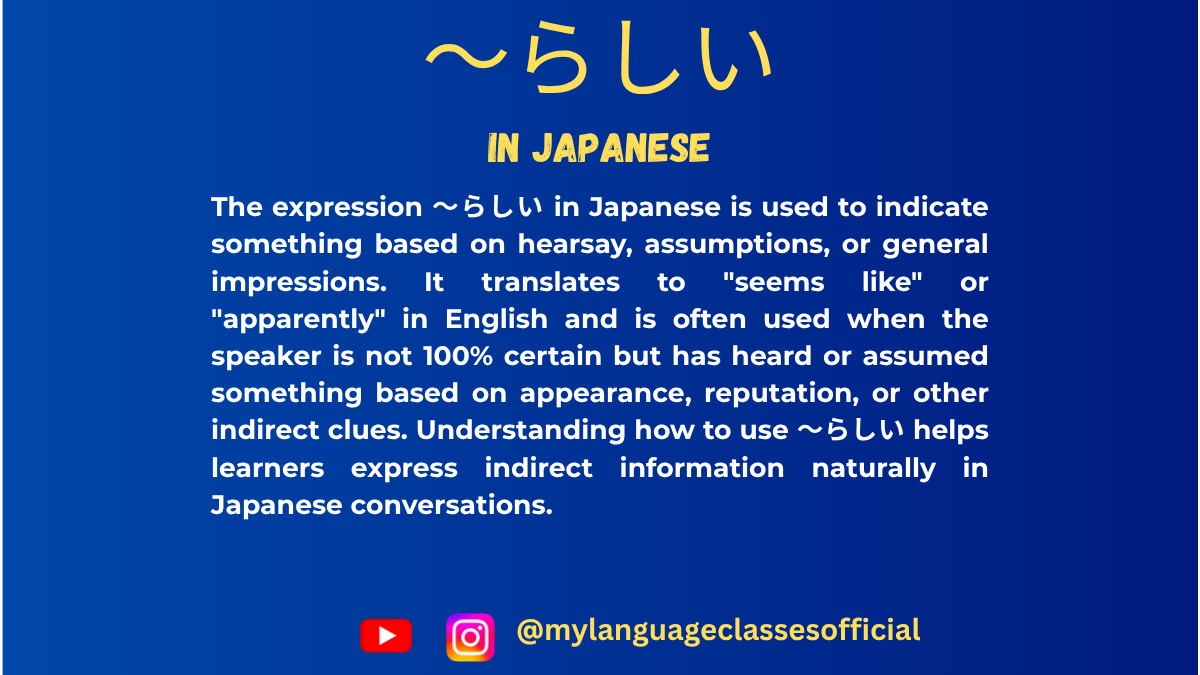
Understanding 〜らしい in Japanese
Understanding 〜らしい in Japanese
When learning Japanese, one of the essential expressions to understand is 〜らしい. This suffix plays a vital role in expressing assumptions, hearsay, characteristics, and appropriateness. In this blog post, we will explore all possible usages of 〜らしい, providing clear explanations and examples.
1. Expressing Hearsay or Second-hand Information
One of the most common uses of 〜らしい is to indicate information that the speaker has heard from someone else but has not personally verified.
Structure:
Verb (Plain Form) + らしい
い-adjective (Plain Form) + らしい
な-adjective + らしい
Noun + らしいExamples:
- そのレストランは美味しいらしいよ。
(I heard that restaurant is delicious.) - たろうは今日休むらしい。
(I heard that Tarou is taking the day off today.) - この映画はめちゃくちゃ面白いらしい。
(I heard that this movie is really interesting.)
Usage Note:
Compared to そうだ, which is also used for hearsay, らしい implies that the information is based on indirect sources rather than direct observation.
2. Expressing Assumptions or Inferences
Another way to use 〜らしい is when making an assumption based on evidence.
Examples:
- たくさんの人が黒い服を着ている。 お蔵式があったらしい。
(Many people are wearing black clothes. It looks like there was a funeral.) - あの子はプロ野球選手の子どもらしい。
(That child seems to be the son of a professional baseball player.)
Usage Note:
This is different from ようだ, which is used for assumptions based on visual evidence, whereas らしい is based on reasoning or known facts.
3. Expressing Typical Characteristics
〜らしい can also be used to describe something that has the typical characteristics of a person, thing, or behavior.
Examples:
- このラーメンは日本らしい味だね。
(This ramen has a very “Japanese” flavor.) - かれは仕事に小さいことまで注意を払う。真面目らしい人だ。
(He pays attention to small details in his work. He is a serious person.) - 她はいつも元気で、すごく子どもらしい。
(She is always energetic, very much like a child.)
Usage Note:
This usage expresses the “essence” of something or someone. It is similar to みたい but is more about inherent qualities rather than just resemblance.
4. Expressing Suitability or Appropriateness
In some cases, 〜らしい can be used to indicate something that fits a certain expectation or role.
Examples:
- 日本らしいけしきゃんの誕生日プレゼントを買いたい。
(I want to buy a birthday present that is “Japanese-like”.) - 少年らしい仕事を求めている。
(Looking for work suitable for young people.)
Usage Note:
This is closely related to the “typical characteristics” meaning but emphasizes suitability rather than mere resemblance.
Situations Where 〜らしい is Used
Below is a list of common situations where 〜らしい is applicable:
- Hearsay – When conveying information heard from others.
- Inference – When making an assumption based on indirect evidence.
- Typical Characteristics – When describing something as having the essence of a person, thing, or behavior.
- Suitability – When expressing something as being appropriate for a certain role or image.
- Rumors – When talking about unverified rumors or gossip.
Final Thoughts
Mastering 〜らしい is essential for expressing assumptions, typicality, and hearsay in Japanese. While it might seem tricky at first, practicing with real-life examples and distinguishing it from similar expressions like そうだ and ようだ will help you use it naturally.
By understanding these nuances, you’ll be able to sound more fluent and natural in your Japanese conversations. Keep practicing, and don’t hesitate to use 〜らしい in different situations!
If you enjoyed this lesson, be sure to check out more posts like this on my blog at My Language Classes. Don’t forget to subscribe my YouTube channel and follow me on Instagram for the latest language learning tips and lessons. Leave a comment below to share your thoughts, or ask any questions you have about nouns.
Happy learning! 😊
📚 Continue Learning Japanese
- そのレストランは美味しいらしいよ。
-
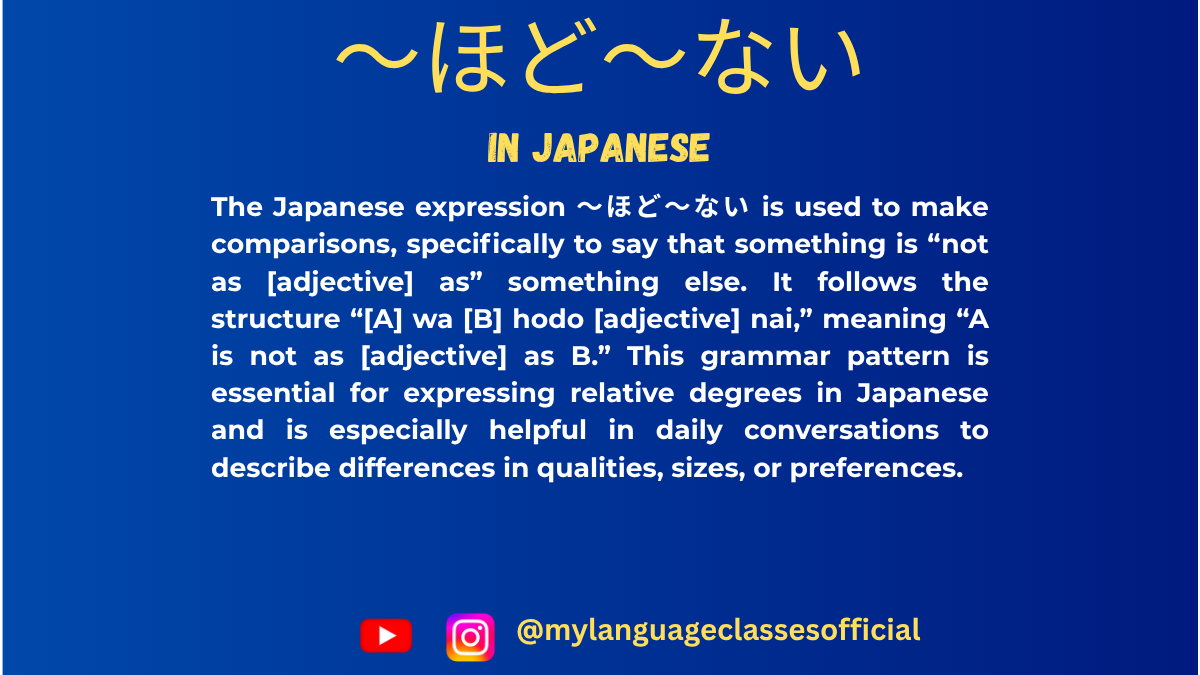
Using 〜ほど〜ない in Japanese
Understanding 〜ほど〜ない in Japanese
The Japanese grammar pattern 「〜ほど〜ない」 is commonly used for making comparisons and expressing degree or extent. It implies that something is “not as much as” something else. This phrase is often translated as “not as… as…” in English.
Basic Structure of 〜ほど〜ない
The structure of this grammar pattern is as follows:
Noun + ほど + Adjective (ない-form)
or
Verb (dictionary form) + ほど + Adjective (ない-form)
General Meaning
「A ほど B ない」 means that B is not as A.
- A is the standard of comparison.
- B is the thing being compared.
Examples:
- この町は東京ほど賑やかではない。
(Kono machi wa Tōkyō hodo nigiyaka de wa nai.)
→ This town is not as lively as Tokyo. - 彼は私ほど速く走れない。
(Kare wa watashi hodo hayaku hashirenai.)
→ He cannot run as fast as I do. - この問題は思ったほど難しくない。
(Kono mondai wa omotta hodo muzukashiku nai.)
→ This problem is not as difficult as I thought.
Situations Where 〜ほど〜ない is Used
1. Comparing Extent or Degree
- Used when two things are compared, but the second one (B) has less intensity than the first (A).
Example:
北海道の冬は東京の冬ほど寒くない。
(Hokkaidō no fuyu wa Tōkyō no fuyu hodo samuku nai.)
→ Hokkaido’s winter is not as cold as Tokyo’s winter.2. Expressing Subjective Opinions
- Often used to express personal opinions about differences in perception.
Example:
数学は国語ほど難しくないと思います。
(Sūgaku wa kokugo hodo muzukashiku nai to omoimasu.)
→ I think math is not as difficult as Japanese.3. Negative Comparison in Abilities or Characteristics
- Used when comparing someone’s ability or characteristics with another’s.
Example:
彼の英語は先生ほど上手ではない。
(Kare no eigo wa sensei hodo jōzu de wa nai.)
→ His English is not as good as the teacher’s.4. Comparing Expectations vs Reality
- Used when expectations were high, but the actual situation is not as expected.
Example:
この映画は評判ほど面白くない。
(Kono eiga wa hyōban hodo omoshiroku nai.)
→ This movie is not as interesting as its reputation suggests.5. Comparing Feelings and Emotions
- Used when talking about feelings that are not as strong as expected.
Example:
彼は私が思ったほど優しくない。
(Kare wa watashi ga omotta hodo yasashiku nai.)
→ He is not as kind as I thought.6. Comparing Physical Condition or Health
- Used to compare health conditions or physical states.
Example:
風邪は思ったほどひどくない。
(Kaze wa omotta hodo hidoku nai.)
→ The cold is not as bad as I thought.7. Comparing Amount or Frequency
- Used when comparing quantity or frequency of actions.
Example:
今日は昨日ほど忙しくない。
(Kyō wa kinō hodo isogashiku nai.)
→ Today is not as busy as yesterday.8. Comparing Importance or Necessity
- Used when comparing levels of importance or necessity.
Example:
宿題はテストほど大事ではない。
(Shukudai wa tesuto hodo daiji de wa nai.)
→ Homework is not as important as tests.9. Comparing Strength of Desire or Preference
- Used to compare desires, preferences, or interests.
Example:
私は映画を見るのが好きですが、本を読むほど好きではない。
(Watashi wa eiga o miru no ga suki desu ga, hon o yomu hodo suki de wa nai.)
→ I like watching movies, but not as much as reading books.
Key Points to Remember About 〜ほど〜ない
- It is used for making comparisons where the second element has less intensity.
- It is often used to express subjective opinions.
- It is used to compare expectations vs reality.
- It can be used in various contexts: ability, frequency, amount, physical conditions, and emotions.
- It follows a simple pattern: “A ほど B ない”, where A is the standard, and B is the thing being compared.
Conclusion
The 「〜ほど〜ない」 grammar pattern is an essential part of Japanese when making negative comparisons. Mastering it will help you express your opinions, compare things effectively, and sound more natural in conversations. Make sure to practice using this structure in daily life to reinforce your understanding!
If you enjoyed this lesson, be sure to check out more posts like this on my blog at My Language Classes. Don’t forget to subscribe my YouTube channel and follow me on Instagram for the latest language learning tips and lessons. Leave a comment below to share your thoughts, or ask any questions you have about nouns.
Happy learning! 😊
📚 Continue Learning Japanese
-
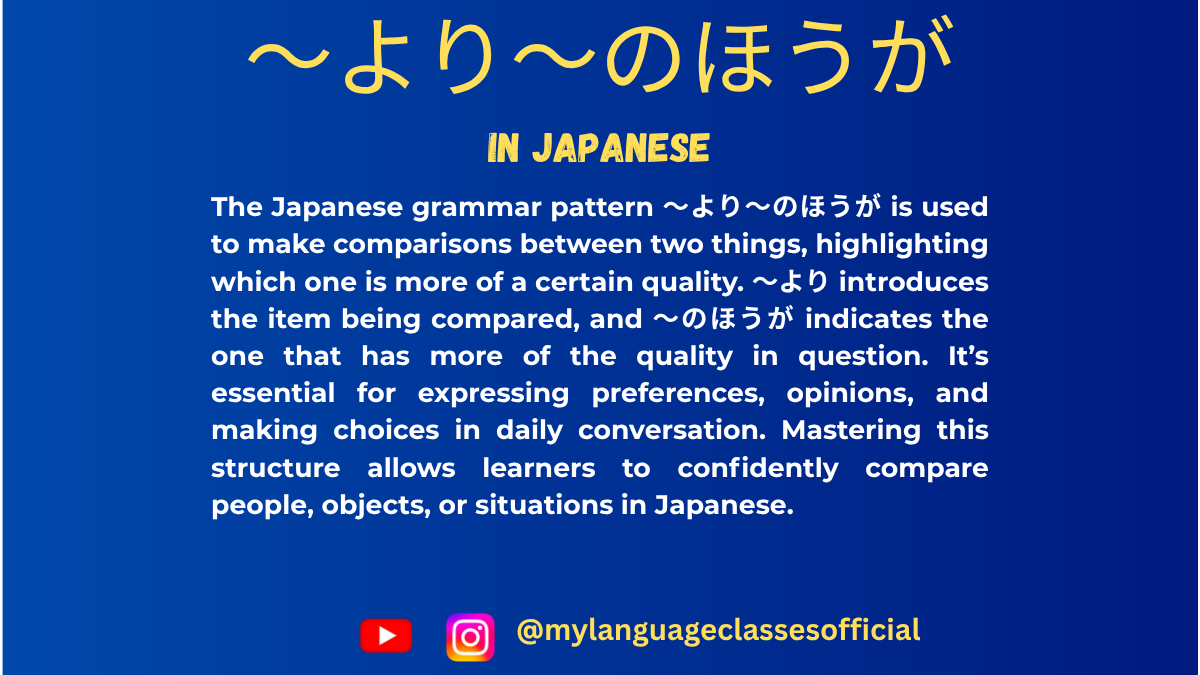
Understanding 〜より〜のほうが in Japanese
Understanding 〜より〜のほうが
The construction 〜より〜のほうが is an essential tool in Japanese for making comparisons. It translates to “X is more than Y” or “X is better/more suitable than Y” and is widely used in everyday conversations, formal contexts, and written communication. This blog post dives into its meaning, usage, and various scenarios.
Structure of 〜より〜のほうが
The pattern is straightforward:
- Yより Xのほうが adjective/descriptive phrase.
- Yより: Indicates the thing being compared (Y).
- Xのほうが: Highlights the preferred or superior item (X).
Example:
- 犬より猫のほうが好きです。
(I like cats more than dogs.)
Core Uses of 〜より〜のほうが
- Preference
When expressing a preference between two items, activities, or options:- 旅行より勉強のほうが楽しいです。
(Studying is more fun than traveling.)
- 旅行より勉強のほうが楽しいです。
- Quantitative Comparisons
Highlighting differences in measurable qualities like size, speed, or price:- バスより電車のほうが早いです。
(Trains are faster than buses.) - このレストランよりあのレストランのほうが安いです。
(That restaurant is cheaper than this one.)
- バスより電車のほうが早いです。
- Capabilities
Used to compare abilities or skills:- 英語より日本語のほうが得意です。
(I’m better at Japanese than English.)
- 英語より日本語のほうが得意です。
- Frequency or Intensity
Comparing how often or how strongly something occurs:- 冬より夏のほうが好きです。
(I like summer more than winter.)
- 冬より夏のほうが好きです。
- Hypotheticals
For discussing hypothetical preferences or outcomes:- 映画館より家で映画を見たほうがいいです。
(Watching a movie at home is better than going to the cinema.)
- 映画館より家で映画を見たほうがいいです。
- Suitability
Indicating one option is more suitable for a specific purpose:- この仕事には男性より女性のほうが適しています。
(For this job, women are more suitable than men.)
- この仕事には男性より女性のほうが適しています。
Situations Where 〜より〜のほうが is Used
- Daily Conversations
- Comparing food, hobbies, weather, or locations:
- 寿司よりラーメンのほうがおいしいと思います。
(I think ramen is tastier than sushi.)
- 寿司よりラーメンのほうがおいしいと思います。
- Comparing food, hobbies, weather, or locations:
- Business and Professional Settings
- Discussing product qualities or work efficiency:
- この方法よりその方法のほうが効率的です。
(That method is more efficient than this one.)
- この方法よりその方法のほうが効率的です。
- Discussing product qualities or work efficiency:
- Travel and Leisure
- Comparing destinations, travel modes, or activities:
- 海外旅行より国内旅行のほうが安心です。
(Domestic travel is safer than international travel.)
- 海外旅行より国内旅行のほうが安心です。
- Comparing destinations, travel modes, or activities:
- Education and Learning
- Comparing subjects or teaching methods:
- 自習より先生に教えてもらうほうがいいです。
(Being taught by a teacher is better than self-study.)
- 自習より先生に教えてもらうほうがいいです。
- Comparing subjects or teaching methods:
- Relationships and Social Scenarios
- Evaluating people or interpersonal qualities:
- 彼より彼女のほうが優しいです。
(She is kinder than him.)
- 彼より彼女のほうが優しいです。
- Evaluating people or interpersonal qualities:
Key Notes
- Implied Context:
In conversational Japanese, the context often allows for the omission of repetitive elements:- 映画よりドラマのほうが好きです。(I like dramas more than movies.)
Can be shortened to:- ドラマのほうが好きです。 (I like dramas more.)
- 映画よりドラマのほうが好きです。(I like dramas more than movies.)
- Neutrality:
The phrase is neutral and doesn’t carry judgmental connotations, making it versatile for all scenarios. - Politeness Levels:
Depending on the situation, you can adjust politeness levels:- Casual: 〜より〜のほうがいい。
- Polite: 〜より〜のほうがいいです。
- Formal: 〜より〜のほうが適切です。
Practice Examples
- 自転車より車のほうが速いです。
(Cars are faster than bicycles.) - テレビを見るより本を読むほうがいいです。
(Reading books is better than watching TV.) - 東京より大阪のほうが住みやすいと思います。
(I think Osaka is easier to live in than Tokyo.)
By mastering 〜より〜のほうが, you can convey nuanced preferences and comparisons effectively. Practice using it in different contexts to build fluency!
What comparisons will you try making today? Let me know in the comments!
If you enjoyed this lesson, be sure to check out more posts like this on my blog at My Language Classes. Don’t forget to subscribe my YouTube channel and follow me on Instagram for the latest language learning tips and lessons. Leave a comment below to share your thoughts, or ask any questions you have about nouns.
Happy learning! 😊
📚 Continue Learning Japanese
- Yより Xのほうが adjective/descriptive phrase.
